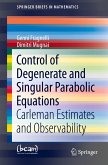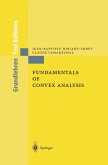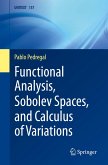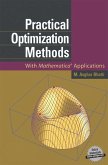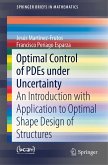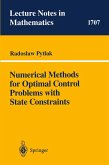This book aims the optimal design of a material (thermic or electrical) obtained as the mixture of a finite number of original materials, not necessarily isotropic. The problem is to place these materials in such a way that the solution of the corresponding state equation minimizes a certain functional that can depend nonlinearly on the gradient of the state function. This is the main novelty in the book.
It is well known that this type of problems has no solution in general and therefore that it is needed to work with a relaxed formulation. The main results in the book refer to how to obtain such formulation, the optimality conditions, and the numerical computation of the solutions. In the case of functionals that do not depend on the gradient of the state equation, it is known that a relaxed formulation consists of replacing the original materials with more general materials obtained via homogenization. This includes materials with different properties of the originals but whose behavior can be approximated by microscopic mixtures of them. In the case of a cost functional depending nonlinearly on the gradient, it is also necessary to extend the cost functional to the set of these more general materials. In general, we do not dispose of an explicit representation, and then, to numerically solve the problem, it is necessary to design strategies that allow the functional to be replaced by upper or lower approximations.
The book is divided in four chapters. The first is devoted to recalling some classical results related to the homogenization of a sequence of linear elliptic partial differential problems. In the second one, we define the control problem that we are mainly interested in solving in the book. We obtain a relaxed formulation and their main properties, including an explicit representation of the new cost functional, at least in the boundary of its domain. In the third chapter, we study the optimality conditions of therelaxed problem, and we describe some algorithms to numerically solve the problem. We also provide some numerical experiments carried out using such algorithms. Finally, the fourth chapter is devoted to briefly describe some extensions of the results obtained in Chapters 2 and 3 to the case of dealing with several state equations and the case of evolutive problems.
The problems covered in the book are interesting for mathematicians and engineers whose work is related to mathematical modeling and the numerical resolution of optimal design problems in material sciences. The contents extend some previous results obtained by the author in collaboration with other colleagues.
Hinweis: Dieser Artikel kann nur an eine deutsche Lieferadresse ausgeliefert werden.
It is well known that this type of problems has no solution in general and therefore that it is needed to work with a relaxed formulation. The main results in the book refer to how to obtain such formulation, the optimality conditions, and the numerical computation of the solutions. In the case of functionals that do not depend on the gradient of the state equation, it is known that a relaxed formulation consists of replacing the original materials with more general materials obtained via homogenization. This includes materials with different properties of the originals but whose behavior can be approximated by microscopic mixtures of them. In the case of a cost functional depending nonlinearly on the gradient, it is also necessary to extend the cost functional to the set of these more general materials. In general, we do not dispose of an explicit representation, and then, to numerically solve the problem, it is necessary to design strategies that allow the functional to be replaced by upper or lower approximations.
The book is divided in four chapters. The first is devoted to recalling some classical results related to the homogenization of a sequence of linear elliptic partial differential problems. In the second one, we define the control problem that we are mainly interested in solving in the book. We obtain a relaxed formulation and their main properties, including an explicit representation of the new cost functional, at least in the boundary of its domain. In the third chapter, we study the optimality conditions of therelaxed problem, and we describe some algorithms to numerically solve the problem. We also provide some numerical experiments carried out using such algorithms. Finally, the fourth chapter is devoted to briefly describe some extensions of the results obtained in Chapters 2 and 3 to the case of dealing with several state equations and the case of evolutive problems.
The problems covered in the book are interesting for mathematicians and engineers whose work is related to mathematical modeling and the numerical resolution of optimal design problems in material sciences. The contents extend some previous results obtained by the author in collaboration with other colleagues.
Hinweis: Dieser Artikel kann nur an eine deutsche Lieferadresse ausgeliefert werden.


